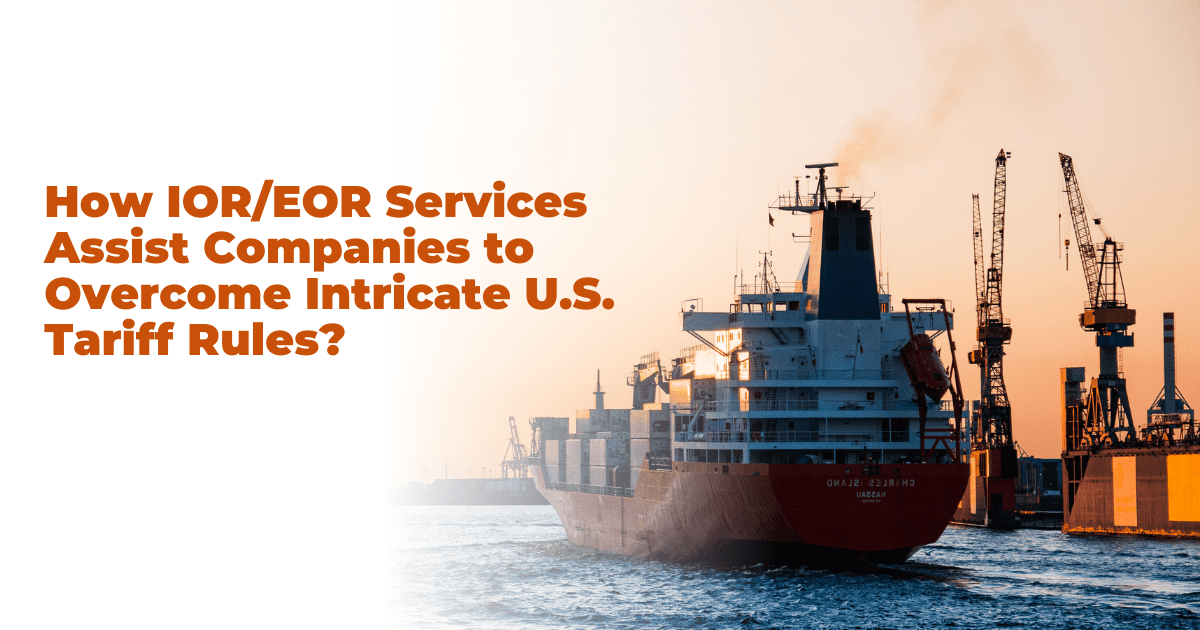
Economic expansion to the U.S. market offers immense opportunities for international businesses. Yet, one of the greatest challenges for companies to import into the United States is coping with intricate tariff rules and compliance regulations. Improper documentation, incorrect classification of commodities, or underpaying customs charges can result in expensively hit penalties, delays in shipments, or confiscation of goods.
This is where Importer of Record (IOR) & Exporter of Record (EOR) services become trusted allies, making cross-border commerce easier and facilitating easy access into the U.S. market.
Knowledge of U.S. Tariff Regulations
Tariffs are leveled by the United States on imported commodities to guard domestic industries and control commerce. Tariffs are different according to:
1. Product category (HS code classification)
2. Country of origin
3. Trade agreements or restrictions in force
4. Customs valuation and duty rates
Given the erratic changes in policy, it can become very challenging for businesses, particularly small and medium enterprises (SMEs) who do not have specialized compliance teams, to manage U.S. tariffs.
What Are IOR and EOR Services?
Importer of Record (IOR): The party liable for attaining compliance with U.S. import regulations, facilitating customs clearance, paying taxes/duties, and keeping import documents.
Exporter of Record (EOR): The entity responsible for making exports meet U.S. regulations, handling licenses, and submitting necessary export paperwork.
As a whole, IOR/EOR services serve as the foundation for companies entering or exiting the U.S. market, making all shipments legal, compliant, and effective.
How IOR/EOR Services Make U.S. Tariff Compliance Easier
1. Precise Classification of Goods
IOR services prevent products from being misclassified under Harmonized System (HS) codes, reducing the risks of misclassification and overpayment or fines.
2. Customs Duty & Tax Management
By pre-calculating relevant tariffs, duties, and taxes, IOR partners allow businesses to project costs and ensure profitability.
3. End-to-End Compliance
From permits to regulatory filing, IOR/EOR providers take on intricate compliance requirements so business can concentrate on sales and expansion.
4. Avoiding Delays & Penalties
Non-compliance results in delay, penalties, or seizure of cargo. A trustworthy IOR prevents these with effective compliance management.
5. Smooth Reverse Logistics
Through EOR services, companies can effectively handle returns, warranty exchanges, or product recalls, ensuring smooth processes and customer satisfaction.
Advantages for Companies Exporting/Importing to the U.S.
Lightened operational load – No necessity to establish a U.S. entity to import/export.
Predictable costs – Transparent tariff calculation and compliance minimize surprise expenses.
Market entry simplified – Companies can enter the U.S. rapidly without legal hassles.
Risk reduction – Remain in compliance with constantly changing U.S. tariff requirements.
Final Thoughts
The U.S. tariff policies are intricate and dynamic, posing serious challenges to overseas businesses. Engaging professional IOR/EOR service providers makes it easier for companies to overcome such challenges. From correct tariff classification to customs documentation, IOR/EOR solutions provide business houses with the assurance to go global without risking compliance.

